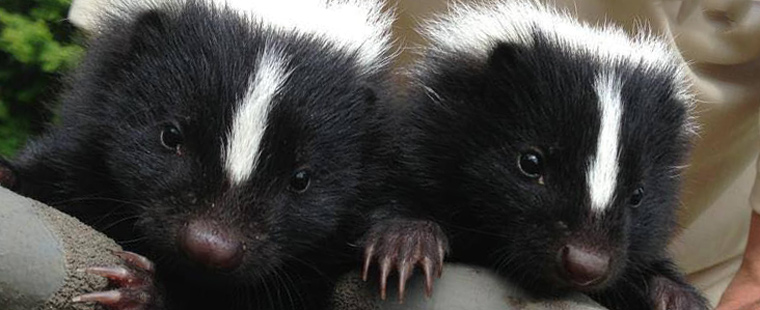-
info@aaanimalcontrol.com
Call us for help in your town
Humane Wildlife Education
Symptoms of a sick skunk
Need skunk removal in your hometown? We service over 500 USA locations! Click here to hire us in your town and check prices - updated for year 2020.
Skunks are susceptible to diseases like any other animal, and when it comes to the symptoms that are key indicators the animal is ill, then there are some that stand out. Most people will be familiar with the indicators of rabies, including frothing at the mouth and an aversion to water, but there are other diseases that can cause other symptoms in skunks, and these can be a good sign that it is well worth steering clear of that animal.

Diarrhea
While skunk feces is quite loose usually, when it has a gastric condition or some kind of parasite in its system then this can often cause the animal to suffer from loose bowels. The side effect of diarrhea is that the skunk may also feel tired and dehydrated, and it may also show signs of being less careful about where it defecates, as skunks will usually return to a latrine to defecate.
Excessive Scratching
This is often a sign that the skunk has parasites that are causing issues either on the surface of the skin, or often in the layers just beneath the surface of the skin. Although most people won't be able to carry out a close examination of the animal, rashes and grazes will be visible on the animal's skin, with the scratching of the animal leaving marks even when scratching through the thick fur of the skunk.
Loss Of Appetite
Skunks do not generally pass up the opportunity to take advantage of an easy source of food, so if you see a skunk bypassing food that has been left laying about, then it will often be the sign that it is quite ill. This is a symptom for a variety of different diseases, and unless there is something significantly wrong with the source of food that the skunk has just avoided, then it will usually mean that the animal itself is not quite right.
Shaking And Tremors
Skunks will usually move with relative grace, and although they are not natural climbers they will be following their nose and ears, and usually show an indication that they are moving towards a particular destination. If you see the animal is shaking or shivering heavily, then this is another symptom of disease, and in skunks this can mean anything from malnutrition and low blood sugar through to more serious bone and nervous system diseases.
For more information, you may want to click on one of these guides that I wrote:
How much does skunk removal cost? - get the lowdown on prices.
How to get rid of skunks - my main skunk removal info guide.


















